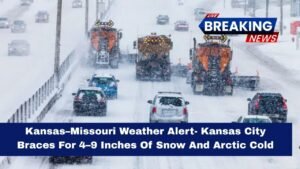A serious collision occurred on Thursday, October 16, 2025 at approximately 3:40 p.m., when a pickup truck crossed into the opposite lane and struck a side‑by‑side UTV as it navigated a blind curve near Fleming Road and Route T in Ray County, Missouri.
According to the Missouri State Highway Patrol:
- The UTV was a 2016 Honda Pioneer, driven by a 50‑year‑old Richmond man.
- The pickup was a 2002 Ford F‑250, operated by a 42‑year‑old man from Orrick, MO.
- As the UTV approached the blind curve, the pickup veered into the middle of the road, and collided head-on with the UTV, pushing it off the roadway.
- The pickup then left the right side of Fleming Road, reentered the roadway, and eventually came to rest in the middle of the road.
Emergency personnel responded to the scene.he UTV driver was not wearing any safety gear or restraint and suffered serious injuries, and was transported to North Kansas City Hospital via Ray County Ambulance District. The pickup’s driver, in contrast, was uninjured and reportedly drove away from the scene.
Both vehicles sustained moderate damage in the crash, though full damage assessments have not been released.
Crash Facts at a Glance
| Detail | Information |
|---|---|
| Date & Time | Oct 16, 2025 ~ 3:40 p.m. |
| Location | Fleming Rd & Route T, near Orrick / Ray County |
| UTV Vehicle | 2016 Honda Pioneer |
| UTV Driver | 50‑year‑old Richmond man |
| Pickup Vehicle | 2002 Ford F‑250 |
| Pickup Driver | 42‑year‑old man from Orrick |
| Road Condition / Curve Type | Blind curve, limited visibility |
| Safety Gear Used | None (UTV driver wore no restraint) |
| Injuries | UTV driver: serious; Pickup driver: none |
| Hospital | North Kansas City Hospital |
| Vehicle Damage | Moderate for both vehicles |
Analysis: How & Why It Happened
Blind Curve Risk & Lane Encroachment
Blind curves significantly limit sight distance, especially on rural roads where shoulders may be narrow or obstructed by vegetation. In this case, the pickup crossed into the centerline mid‑curve — likely before its driver saw the oncoming UTV. That encroachment left the UTV driver with almost no time or space to react.
Lack of Safety Restraint
One stark detail: the UTV operator was not wearing any safety device or restraint. In UTV crashes, safety gear (helmets, restraints) dramatically reduce the severity of injuries. Without them, even moderate collisions can cause serious trauma.
Vehicle Dynamics & Damage
The impact thrust the UTV off the roadway, while the pickup itself left the shoulder, reentered the road, and stopped in the middle. The moderate damage on both vehicles suggests neither was completely destroyed — but damage was sufficient to disable or severely hamper their structural integrity.
Injury vs. Escape
That the pickup’s driver emerged unhurt while the UTV operator was seriously injured underscores how critical protective measures and collision dynamics matter. The force of the impact, the angle, and lack of restraint likely contributed heavily to the UTV driver’s injuries.
Legal, Safety & Aftermath Considerations
- Liability & Fault — The pickup driver’s encroachment into the centerline on a blind curve suggests possible negligence. Investigators will assess speed, lane discipline, and possible impairment.
- Insurance Claims — The injured UTV driver may pursue bodily injury claims, seeking compensation for medical bills, pain & suffering, and damage to the UTV.
- Safety Protocols — This crash is a reminder: UTV operators should always use seatbelts, helmets, and roll cages. Additionally, motorists must stay within lane boundaries, especially around curves.
This collision on a blind curve between a pickup truck and a UTV left one driver seriously injured and underscores how quickly split‑second errors can lead to devastating results.
Key factors were the pickup’s encroachment into the oncoming lane, limited visibility of a curve, and the lack of any safety restraint for the UTV driver.
As the investigation continues, the crash stands as a cautionary reminder: always maintain proper lane discipline, respect curves, and use safety gear — especially when you’re operating vulnerable vehicles like UTVs.




